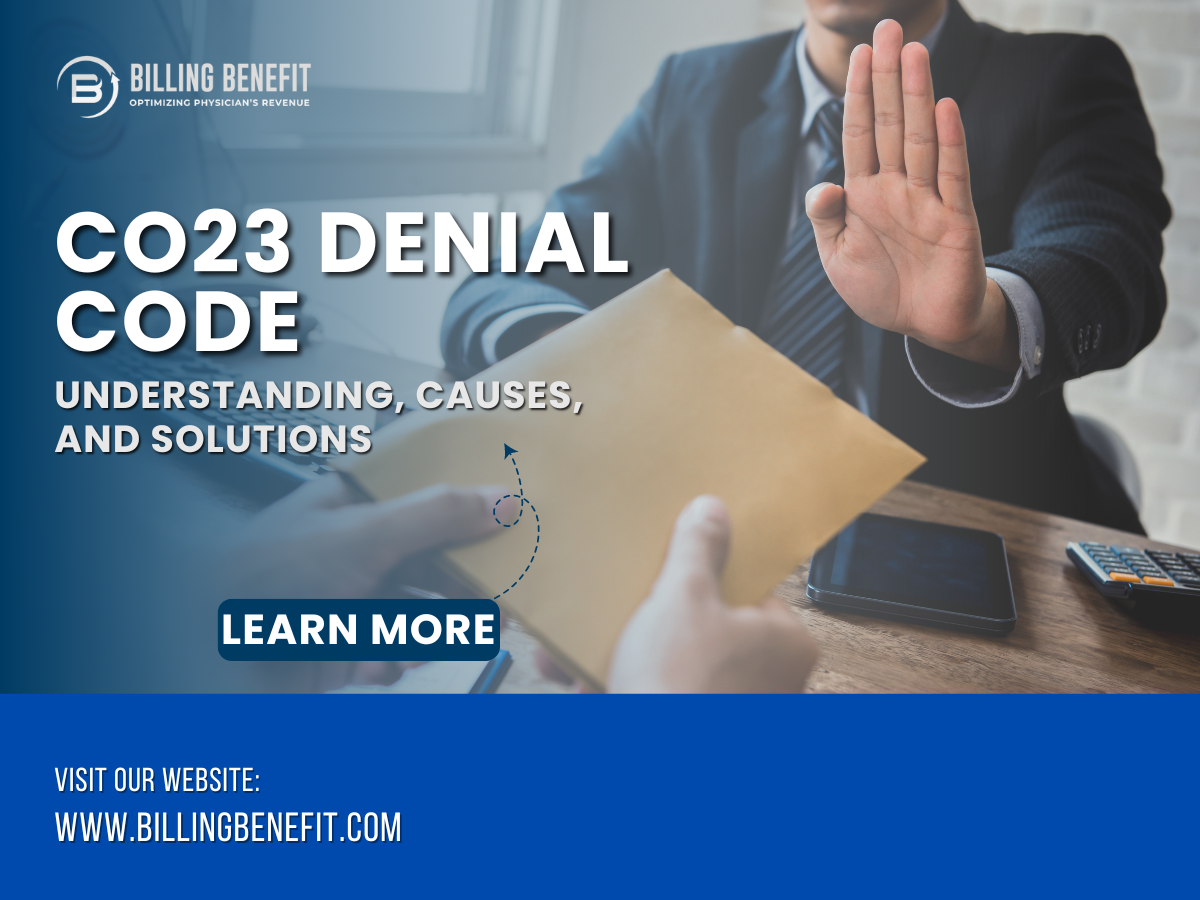The CO23 denial code commonly appears in medical billing when claims are adjusted due to the impact of a prior payer’s adjudication. This code indicates that a primary insurance’s payments or adjustments have influenced the claim, affecting how the secondary payer processes it.
For healthcare providers, CO23 denials can be a headache. It indicates that the secondary insurance is not responsible for further payment because the primary insurer has already paid or adjusted the claim sufficiently. This can result in unpaid balances or delayed reimbursements, leading to confusion and potential loss of revenue.
What is the CO23 Denial Code?
The CO23 denial code is triggered when a primary insurer’s payment or adjustment exceeds the allowable amount set by the secondary insurer. This can happen due to various reasons, such as duplicate claims, incorrect coordination of benefits, or discrepancies in insurance plan limitations.
For example, imagine a situation where a patient has dual insurance coverage—one primary and one secondary. If the primary payer covers the total allowable amount based on their fee schedule, the secondary insurance may not pay any additional amount, leading to a CO23 denial. In simpler terms, the secondary insurer acknowledges that the primary payer has already handled the claim, so there’s no further obligation on their end.
Causes of CO23 Denial Code
Several scenarios can lead to a CO23 denial code:
- Inaccurate Payment or Adjustment
Mistakes in payment processing or system errors during adjudication by the primary payer can lead to inaccurate adjustments or payments. This discrepancy results in a denial code 23 from the secondary payer. - Coordination of Benefits (COB) Issues
If a patient is covered by more than one insurance, COB plays a crucial role. Any conflicts or errors in coordinating benefits between primary and secondary insurers can lead to CO23 denials. - Duplicate Claims
Duplicate claim submissions are flagged by insurers to avoid double payments. If the same service is billed multiple times, the secondary payer may deny it with a CO23 code, noting that the primary has already processed it. - Missed Filing Deadlines
Filing claims within the stipulated timeframes is vital. If the provider misses the deadline, the claim might be denied under the CO23 code, as the secondary payer considers it an invalid submission. - Out-of-Scope Services
When services rendered are not covered under the patient’s policy, a CO23 denial may be triggered. This could be due to medically unnecessary services, exclusions in the plan, or coverage limitations. - Incomplete Documentation
Failing to provide adequate supporting documentation (such as prior authorizations or medical necessity details) can result in claim denials, including the CO23 code.
How to Resolve CO23 Denial Code Issues
If your claim gets flagged with a CO23 denial code, follow these steps to resolve it:
- Review the Adjudication Details
Examine the remittance advice (RA) or explanation of benefits (EOB) from the prior payer. Identify how the adjustments were applied and whether there are any underpayments or discrepancies. - Check Secondary Payer’s Guidelines
Review the fee schedules and allowable amounts for the secondary payer. Compare them with the primary payment to understand if the denial is justified. - Verify Coordination of Benefits
Ensure that the coordination of benefits between the primary and secondary payers is accurate. Correct any errors in COB processing to prevent future denials. - Submit an Appeal with Supporting Documentation
If you find an error or have additional information to support your claim, submit an appeal to the secondary payer. Include all necessary documents, such as medical records, proof of primary payment, and a detailed explanation of the situation. - Monitor and Follow Up
Keep track of your appeal status and follow up regularly with the secondary payer to ensure timely resolution. - Stay Updated on Payer Policies
Regularly review updates from insurance payers on how they process claims. Staying informed can help you avoid common denial triggers like CO23 in the future.
FAQs
What is a CO23 denial code?
The CO23 denial code indicates that the secondary payer has denied the claim due to the impact of prior payer(s)’ adjudication, including payments or adjustments made by the primary insurance provider.
Why does the CO23 denial code occur?
This code typically occurs when the primary insurance has paid or adjusted the claim, and there is no remaining balance for the secondary insurance to pay.
How can I resolve a CO23 denial code?
Start by reviewing the EOB or RA to understand the primary payer’s adjudication. Verify COB accuracy, gather supporting documentation, and submit an appeal to the secondary payer if necessary.
What is the best way to prevent CO23 denials?
Proper eligibility verification, accurate documentation, timely submission of claims, and monitoring payer policies are crucial steps to prevent CO23 denials.
Can I appeal a CO23 denial code?
Yes, you can appeal a CO23 denial by submitting relevant documentation that supports your claim, such as proof of primary payment and details of medical necessity.
What should I do if my CO23 appeal is denied?
If your appeal is denied, you may escalate the issue to higher-level personnel within the insurance firm or consider seeking guidance from a medical billing expert to resolve the issue.
By understanding the nuances of the CO23 denial code and implementing proactive measures, healthcare providers can minimize claim denials and ensure smoother revenue cycles.










